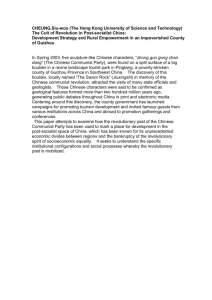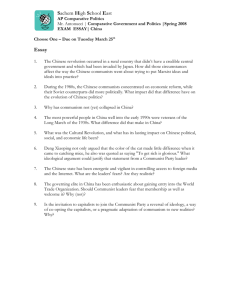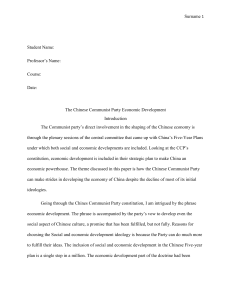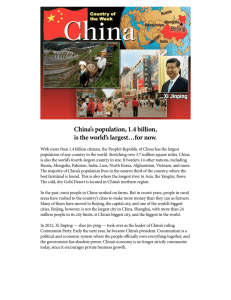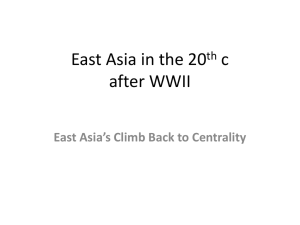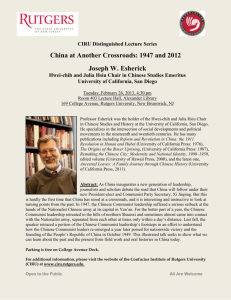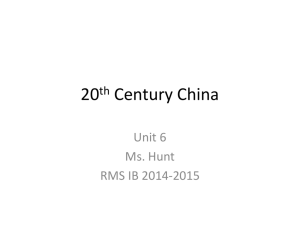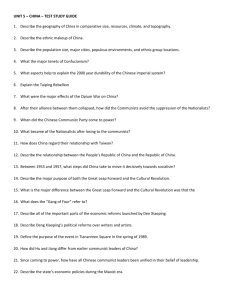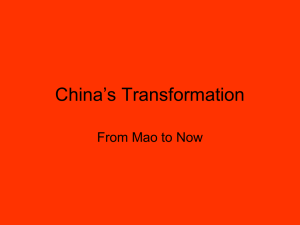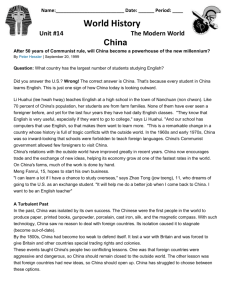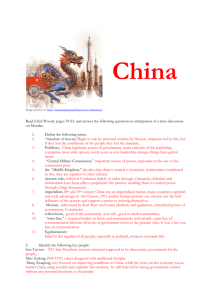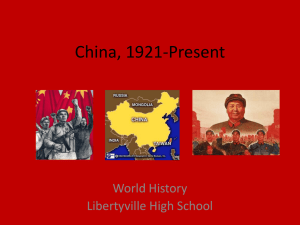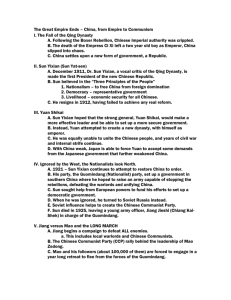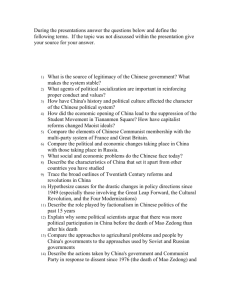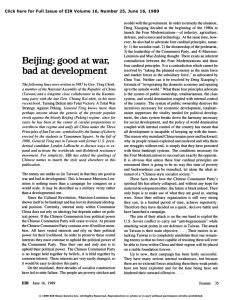5 Things You Need to Know about China
advertisement
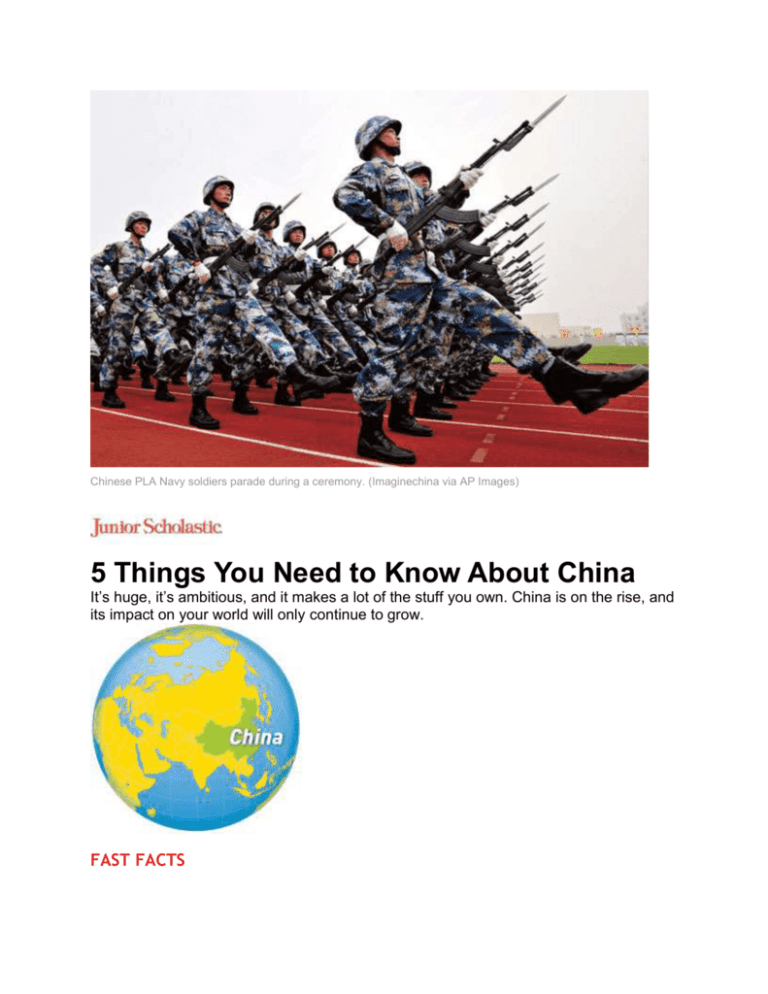
Chinese PLA Navy soldiers parade during a ceremony. (Imaginechina via AP Images) 5 Things You Need to Know About China It’s huge, it’s ambitious, and it makes a lot of the stuff you own. China is on the rise, and its impact on your world will only continue to grow. FAST FACTS AREA: 3,696,100 sq mi (U.S.: 3,717,796 sq mi) POPULATION: 1.3 billion (U.S.: 312 million) PER CAPITA GDP*: $8,400 (U.S.: $48,100) LITERACY: males, 96%; females, 89% (U.S.: 99%) LIFE EXPECTANCY: males, 73 years; females, 77 years (U.S.: 76/81) (Jim McMahon) * GDP stands for gross domestic product; per capita means “per person.” The amount is the value of all goods and services produced in a country in a year, divided by the population. It often is used as a measure of a nation’s wealth. WORDS TO KNOW Communist(adj): related to a system in which businesses are owned by the government and individual freedom is limited dissident(n): one who strongly protests a political system Western(adj): referring to the democracies of the U.S. and Europe How important is China? Look no further than the tag on your shirt. Chances are it says “Made in China.” In fact, most of your jeans, socks, cell phones, TVs, and computers are probably made there as well. But there’s a lot more to China than the stuff it makes. China is an ancient civilization— dating to at least 2200 B.C., when pharaohs were building pyramids in Egypt. The Chinese invented the compass, the umbrella, gunpowder, and silk cloth. But through the centuries, China was largely isolated and had little interaction with the people of Europe and the Americas. The story of China’s rise at the end of the 20th century is one of the most dramatic in history. Since the late 1970s, the country has been transformed from a place where millions of people lived in poverty into an industrial powerhouse. New factories and skyscrapers seem to pop up every day. China now has the second-largest economy in the world, after the U.S. And some experts think China could surpass the U.S. in the years ahead. As an economic and political superpower, China’s actions have an enormous effect on the U.S. and the world. Here are five things you should know about China. 1. CHINA IS NOW THE WORLD’S WORKSHOP The numbers are staggering. About 88 percent of the shoes and 90 percent of the toys sold in the U.S. are made in China. A single company, Foxconn, assembles 40 percent of the world’s electronics, including iPhones and iPads. China’s workforce is huge. One plant alone, Foxconn City in Shenzhen, employs 230,000 workers—more than the population of Birmingham, Alabama. Yet scarcely four decades ago, China was a desperately poor nation. In 1978, China’s leaders began to adopt reforms that loosened government control of the economy, encouraged people to start businesses, and opened up the country to foreign investment. These moves led to millions of new jobs and growing prosperity in China. U.S. and European companies have taken advantage of China’s low wages by moving manufacturing jobs there. An estimated 70 percent of products sold by Wal-Mart are made in China. 2. CHINA IS THE MOST POPULOUS NATION People are China’s greatest resource. But having the largest population in the world— currently more than 1.3 billion—can also be a great burden. In 1966, the average Chinese family had six children. By 1979, the population had reached almost 1 billion. Worried about being able to produce enough food for its people, the government limited most Chinese families to only one child. The one-child policy imposes fines on couples that have a second child. In some cases, local authorities have even sterilized women who have a second child. The one-child rule has been more strictly enforced in big cities than in rural areas. By some counts, the policy has prevented about 350 million births. 3. THE ECONOMY HAS IMPROVED TREMENDOUSLY China has been a Communist country since 1949. In that year, Mao Zedong and his allies won a civil war and established dictatorial rule by the Communist Party, which maintained strict control over agriculture and manufacturing. China entered a long, dark period. Hostile to the U.S. and other Western nations, Mao cut China off from much of the world. His social policies worsened the effects of famines that killed millions and devastated the economy. After Mao died in 1976, the country’s leaders began to steer China away from a government-controlled economy to one in which individuals could own businesses. That change led to the country’s current prosperity. Politically, things have changed less. The Communist Party is still the only legal political party. And the Party—not the country’s people— chooses the nation’s leaders. This fall, Xi Jinping (shee jin-ping) will replace Hu Jintao as president. 4. HUMAN RIGHTS ARE STILL VERY LIMITED IN CHINA The Communist Party still retains its hold on political power, limits free speech, and represses dissidents. Those are people who try to fight the system. They are often silenced or even imprisoned. The government also goes to great lengths to limit access to the Internet. It employs a vast system of censors nicknamed the “Great Firewall” that blocks thousands of websites, including Facebook and YouTube. People who enter a Google search that the government believes is dangerous will receive a notice that it is “not found.” Critics say that the forbidden words can be absurdly minor. Even the word carrot is blocked, reportedly because it contains the Chinese character for President Hu’s name. It’s a lot easier for the government to control television and newspapers than cyberspace— especially when there are 500 million Internet users eager for information. 5. U.S. RELATIONS WITH CHINA ARE CRUCIAL The world’s two economic giants need to work together. Their cooperation is essential to deal with such problems as climate change and North Korea’s nuclear weapons program. Maintaining good relations is often difficult. Some Chinese companies create cheap knockoffs of U.S. brands. And the Chinese government makes it difficult for U.S. companies to do business there. In addition, China is allied with countries not friendly to the U.S., such as Syria and Iran. China is also challenging U.S. influence by expanding its military power in the Pacific. Even so, many experts believe that China’s rise benefits the United States. As President Obama has said, “China’s peaceful rise is good for the world, and it’s good for America.” This article originally appeared in the September 3, 2012 issue of Junior Scholastic. For more from Junior Scholastic, click here.
